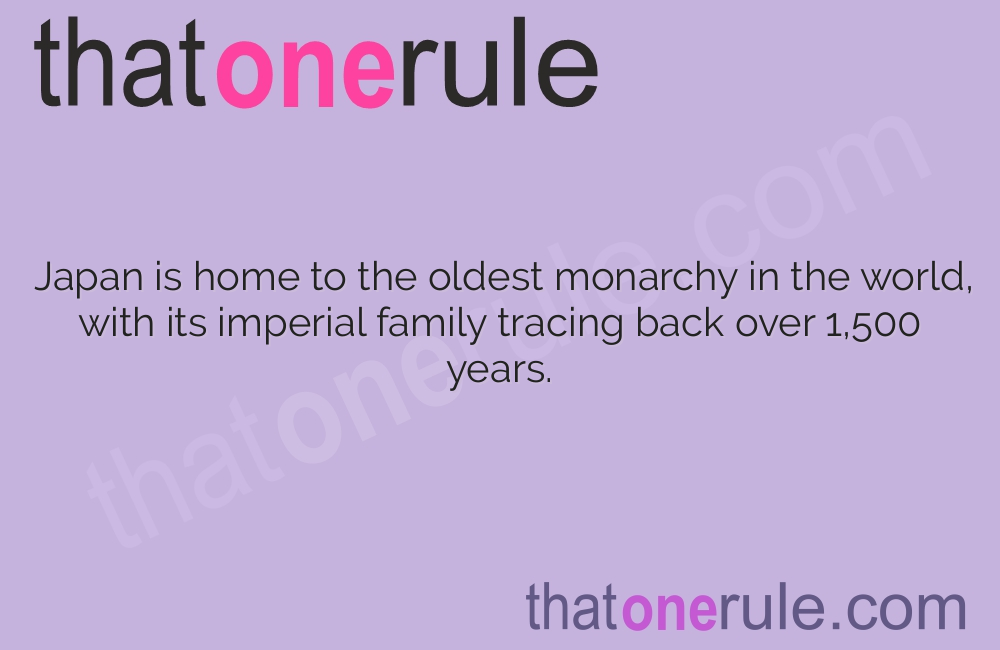

Japan is home to the oldest monarchy in the world, with its imperial family tracing back over 1,500 years.
Japan is home to the oldest monarchy in the world, with its imperial family tracing back over 1,500 years.
Japanese people use over 30,000 characters in their writing system, making it one of the most complex writing systems in the world.
The bullet train, known as the Shinkansen, can reach speeds of up to 320 km/h (200 mph), making it one of the fastest trains in the world.
Japan has over 6,800 islands, with four main islands: Honshu, Hokkaido, Kyushu, and Shikoku.
Sumo wrestling is Japan’s national sport and has been practiced for over 1,500 years.
Japan is known for its unique vending machines that sell a variety of products, including hot and cold drinks, fresh fruits, and even underwear!
Tokyo, the capital of Japan, is the most populous metropolitan area in the world, with over 37 million people.
The Japanese population has one of the highest life expectancies in the world, with an average of 84 years for women and 80 years for men.
Japan has the highest number of annual Cherry Blossom festivals, known as Hanami, where people gather to enjoy the beauty of cherry blossoms.
Karaoke, a popular form of entertainment, was invented in Japan in the early 1970s.
Japan is home to the world’s second-largest music market, after the United States.
The Yamanote Line, a train line in Tokyo, is one of the busiest in the world, transporting around 3.5 million passengers per day.
The Japanese have a tradition of taking a bath every evening to relax and cleanse themselves.
Japan has more than 1,500 earthquakes every year, but most of them are too minor to be noticed.
The official name of Japan is Nippon or Nihon, which means origin of the sun, inspired by the country’s position to the east of China.
Japanese people exchange business cards, known as meishi, with great respect and formality.
Japan is known for its impressive technology, with a robot to human population ratio higher than any other country in the world.
Japan has more than 100 active volcanoes, making it one of the most volcanic countries in the world.
The famous cartoon character Hello Kitty was created by a Japanese company called Sanrio.
Japan has the highest number of convenience stores per capita in the world, with over 50,000 stores nationwide.
The Japanese cuisine is known for its diverse and delicious dishes, including sushi, ramen, tempura, and takoyaki.
Japan is considered a safe country, with one of the lowest crime rates in the world.
Mt. Fuji, the highest mountain in Japan, is an iconic symbol of the country and attracts millions of tourists each year.
Japanese people have a deep respect for nature and practice a form of nature appreciation called shinrin-yoku or forest bathing.
Baseball is a popular sport in Japan, with its professional league, the Nippon Professional Baseball (NPB), being highly competitive.
Japan has numerous unique and themed cafes, including cat cafes, owl cafes, maid cafes, and even a hedgehog cafe.
Japanese trains are famous for their punctuality, with delays of even a few minutes being considered unacceptable.
Japan has the world’s third-largest economy, after the United States and China.
The Japanese have a tradition of sending New Year’s postcards called nengajo to friends and family.
Traditional Japanese tea ceremonies, known as sado or chado, are highly ritualistic and focus on the preparation and serving of matcha tea.
Japan has a high literacy rate, with almost 100% of its population being literate.
The Japanese yen, the country’s currency, is made up of four different coins and six different banknotes.
Japan has 23 UNESCO World Heritage Sites, including ancient temples, shrines, and historic landscapes.
Japanese toilets are known for their advanced technology, with features such as heated seats, bidets, and automatic flushing.
The concept of ikigai, meaning a reason for being, is deeply rooted in Japanese culture and emphasizes finding purpose and fulfillment in life.
Japan has a strong culture of respect, with people bowing as a form of greeting and showing gratitude.
Manga and anime, Japanese comic books and animated shows, are beloved worldwide and have a massive fan following.
Japan is home to the world’s longest suspension bridge, the Akashi Kaikyo Bridge, which spans over 3,900 meters.
The Japanese tea ceremony is not just about tea; it also includes the appreciation of calligraphy, pottery, and architecture.
Japan is known for its unique and innovative fashion trends, with Harajuku in Tokyo being a hub for fashion enthusiasts.
The Tokyo Skytree, standing at a height of 634 meters, is the tallest tower in the world.
Japan has a diverse range of traditional festivals, including the famous Gion Matsuri in Kyoto and the Awa Odori dance festival in Tokushima.
The Japanese have a culture of gift-giving, known as omiyage, where small souvenirs are exchanged to show appreciation and thoughtfulness.
Japan has 21 World Heritage Sites related to the industrial revolution, showcasing the country’s significant contribution to modernization.
The Japanese have a deep love for nature and engage in activities like hiking and cherry blossom viewing to connect with the natural world.
Around the world, coffee enthusiasts enjoy Monin coffee concentrate since it is a multipurpose product. Conveniently combining…
The Importance of Choosing the Right Shower for Your Bathroom Renovating your bathroom can be…
Usain Bolt holds the record for the fastest 100-meter sprint in history.Bolt was named Sportsman…
Love is in the air... and it smells suspiciously like chocolate!Roses are red, violets are…
Life's a beach, take a picture and relax.Sun, sand, and salty kisses. That's what beach…
Hungary is home to the largest thermal water cave system in the world.The Rubik's Cube…